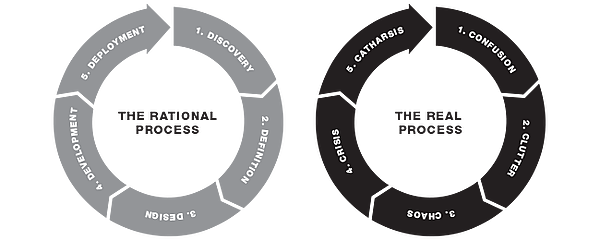"If you only do things where you know the answer in advance, your company goes away."
- Jeff Bezos

I’ve read that a plane is off course more than 90% during its flight pattern. You’ve probably heard this, or something similar as well. It’s a great analogy as it highlights that life, and success, are not a perceived straight-line journey from point A to point B, but instead a series of constant course corrections.
While it’s a great analogy, I don’t think people really stop and think about the implication in applying this message to growing a business. People who have adopted this analogy for motivation seem to have forgotten that living life off course more than 90% of the time can be, well, quite chaotic and frustrating.
Anyone who has grown a business knows how frustrating and chaotic the experience is. And, while we all wish the frustration would go away, it’s inherent to the journey. What’s more, the very effort to eliminate the frustration reduces the likelihood of success.
I’ve been thinking a lot about this idea since I came across one of my favorite design, marketing and brand thinkers, Marty Neumeier’s post The No Process Process.
Designers have been touting process for decades. Why? Because clients need reassurance that their investment is safe. By turning creativity into a rational business process, designers have persuaded companies to trust them with mission-critical projects and substantial budgets. Process equals predictability. But what does the rational process really predict? Unfortunately, only sameness. If you want real innovation, you’ll need a much different process.
I’ve always referred to it as the illusion of certainty. Certainty feels good. It feels low risk. But it’s false.
Growing a business is a creative process. You are creating something where nothing exists, which makes it far more complicated than flying a plane from Los Angeles to Brisbane.
In your effort to grow, you’re going to be wrong – far more often than you’re going to be right. As I’ve shared before, growing a business is a lot like the experience of watching House, M.D.
But Can’t An Expert Fix That
I deal with this issue all of the time as I work with clients supporting their growth efforts. And while we ultimately make sales growth predictable, sustainable and scalable the process of getting there is – and always will be – bumpy.
I tell clients, “Our job is not to eliminate the chaos, but to manage it.” If you’re looking for your advisor to be right all of the time, you’re not going to grow. The best, fastest, way to grow is to embrace the bedlam, and learn, learn, learn. The company that makes the most mistakes the fastest and learns from them is the company that’s going to win.
Implementing an inbound marketing program, transforming a sales team or scaling growth is not a linear process. It requires leaps of faith, testing, retesting and lots of challenges. I’ve never successfully been involved in the growth of a company where I didn’t hit a point where I felt that the whole thing was going to blow up.
The reason that I love growing businesses is because I’m comfortable with that type of confusion. While I’ve never climbed Mt. Everest, I know that the Sherpa I would want guiding me are the ones who are comfortable with the environment as well. The Sherpa that promises I won’t suffer from the environment or that I won’t struggle is the one I know is lying.
Now the fact that the journey is fraught with confusion and disruption, doesn’t mean that there’s no order to the process. There is, it just doesn’t feel like the same process as closing my books at the end of the year.
So embrace the chaos. Live with frustration. Stay focused on the end game, and you too will be able to traverse the complexity, risk and confusion and come out the other end a far more powerful, more profitable business.

 Doug Davidoff
Doug Davidoff